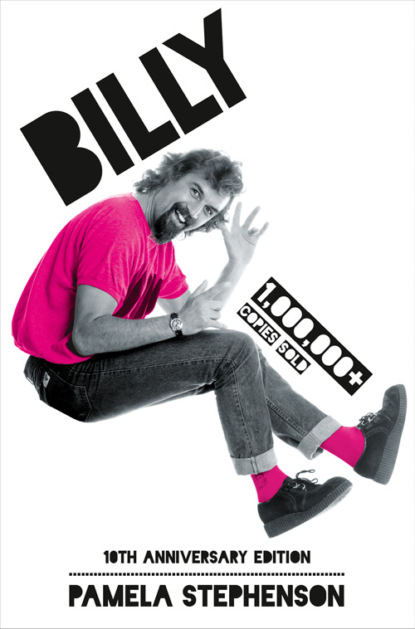По всем вопросам обращайтесь на: info@litportal.ru
(©) 2003-2024.
✖
Billy Connolly
Настройки чтения
Размер шрифта
Высота строк
Поля
His bid to be an altar boy was thwarted when he and some other boys, who were all the same height, were chosen by a priest to help at Benediction. In that service, most of them would be lined up along the altar railings holding candles. The envied, glorious one, however, was the boy who stood up higher than everyone else with the golden thurible, proudly dangling the vessel so it puffed out incense at the end of every swing. Everyone wanted to be that exalted creature, so when Billy and his same-height friends filed into the sacristy and saw the thurible hanging there on its special hook, each and every one of them made a dive for it.
‘I saw it first!’
‘No you didn’t!’ There was a loud and furious scuffle that ended when the priest stormed in and grabbed them all by the jerseys.
‘Out! Out! And don’t you darken this door again!’
Billy continues to love incense, although the last time that sweet and heavy smoke drifted towards him was years ago at Bob Geldof’s wedding, when the late Paula Yates glided down the aisle in a scarlet ball dress. It’s really a good thing he doesn’t go to church any more, because if he saw a thurible nowadays he might loudly interject, ‘I don’t like to spoil the party, but your handbag’s on fire.’
Despite his early horror at the graphic gruesomeness of Catholic statues, Billy grew to like the ritualistic aspects of the religion and he was grateful for the safety and comfort it provided. He loved the hymns, and today laments that many of the old tunes have changed. ‘Now the Catholic Church sounds like the fucking Bethany Hall,’ he moans.
At school, he had religion every day, just before lunch. It included music taken from books of folk songs, which delighted Billy, and launched his interest in folk music. They used to sing ‘Lilliburlero’ (now the signature tune for Billy’s favourite radio station, the BBC World Service) and ‘The Lincolnshire Poacher’, and ‘Glorious Devon’. ‘Heart of Oak’ was a great favourite, too, and Billy would give strong voice to the rousing chorus:
‘Steady boys, steady.
We’ll fight and we’ll conquer, again and again!’
With the exception of the folk singing, Billy was frustrated at the dullness of religious studies at school. What really piqued his interest was the stuff no one would cover, such as ‘Did Jesus have brothers and sisters?’ The teachers seemed to dodge such subjects, and were not open to questions. Billy certainly had a great deal of curiosity about many things. For example, on the back of his classroom jotter was a table of weights and measures. It was headed Avoirdupois’, which he pronounced ‘avoid dupoy’, and he longed to know what it was all about, but no one even mentioned it. There were so many intriguing mysteries. He was madly interested in geisha girls but, when he asked a teacher what they were, he was beaten for ‘being immoral’.
Billy’s cousin John, a very thin boy, also attended St Peter’s. Billy largely ignored him, since ‘Skin’, as they called him, was in a lower class, but reports of John’s cleverness, elaborate practical jokes, and truant behaviour filtered through the school. John’s mother was at her wits’ end. She would watch her son being escorted into the classroom in the morning, but by the time she got home, John would already be sitting comfortably in their kitchen, warming his feet and drinking a mug of milk. Legend had it that when John’s father had returned from the war, three-year-old John had darted out from behind the door and savagely kicked him, in protest for having returned to spoil the cosy life he had with his mother. Apparently, this Oedipal rage never left him. Billy’s father advised his brother to take a very hard line with John. William’s thinking on many subjects was very black-and-white.
After Michael’s arrival, the living space at home had become even more cramped. Mona and Margaret shared one room, with Michael in a cot. In the other room, which was a living room by day, Billy shared a sofa-bed with his father. Late one night, when Billy was ten, he woke to find his father ‘interfering’ with him, as he puts it. Then, and for the next four or five years, his father’s frequent sexual abuse was a mystery to him, like being in an accident. ‘The most awful thing,’ says Billy now, fully grasping the anatomy of shame, ‘was that it was kind of pleasant, physically, you know. That’s why nobody tells. I remember it happening a lot, not every night, but every night you were in a state thinking it was going to happen, that you’d be awakened by it. I would pray for the holidays. I couldn’t wait for us to go to the seaside because then we had separate beds.’
It’s hard to know exactly why William molested his own son. He had the appearance of being extremely religious and, since the Catholic Church was very strict about the sanctity of marriage, he saw no possibility of divorce from Mamie or remarriage at any point: however, that doesn’t really explain why he chose this particular form of sexual expression. It wouldn’t be the first time extreme sexual repression in an ostensibly religious person has led to ‘unspeakable’ acts. As Carl Jung explained, denial of our shadow side will often cause it to rise up against us. Perhaps William himself had been sexually abused in childhood, as is so often the case with perpetrators. In fact, historical accounts of that culture and time would suggest that, in those overcrowded conditions, incest was extremely common.
At any rate, Billy kept the dark secret locked away until the early eighties, when he and I were sitting in our car outside the Glasgow hospital the night his father died. ‘That creep.’ I cried with him, and not because his father, in his scheme of things, was about to meet his maker. It was William’s hypocrisy that really got to both of us. He was always passing judgement on Billy for his ‘sinfulness’ and lack of conformity to the Catholic faith, while at the same time he was hurting him so profoundly … in so many ways. Since that moment, Billy has found various ways to heal and make adult sense of all his early abuses, but back then, when there was little safety anywhere in his life, what saved him?
For one thing, he absolutely loved reading. Not his school-books – he thought they were very dull, although the class would sometimes be read to on a Friday, and that was quite soothing. White Fang and adventure stories from Canada and the Yukon were popular. Billy often imagined himself donning a huge, woolly jacket and striding into the northern wildernesses to pan for gold, a perfect way to escape from Stewartville Street.
There was a comprehensive library system in Glasgow, and his local branch, a vast pseudo-classical building, was just across the tram-lines in Partick. It was wonderfully warm inside, and full of people of all ages, especially elderly folk. Every newspaper was there, mounted on a board with a special cord for turning the pages. Billy had worked through the infants’ section years ago, steamed right through the boys’ corner (Just William, Enid Blyton and all kinds of adventure stories), and when he became twelve he was finally able to swagger up the street with not one, but two books. That’s when he discovered Tibet. Once he came across Seven Years in Tibet he was completely hooked, fascinated by its isolation from the rest of the world.
Billy devoured books that carried pictures and diagrams to help him spot different types of fighter aircraft by the colour and shape of the wings. He made models of some of them, and spotted a number of war planes that were still flying in the fifties, such as the Dakota, a massive transport plane, and a couple of fighter planes, the Gloster Meteor, which had tanks on its wings, and the two-tailed Vampire. In those days, all aeroplanes were very different and so were the cars. No one would ever mistake a Humber Hawk for a Standard Vanguard, or a Ford Prefect for an Austin Seven. Billy’s favourite was the sporty Sunbeam Alpine, though he was thrilled when he spotted an Armstrong Siddeley, with its badge shaped like a sphinx, or a Triumph Mayflower, like a petite limousine.
Nowadays, Stewartville Street is accessible only to pedestrians, but at that time cars could drive in and park in the centre of his street. These beauties were never locked, so he would sneak inside to toot the horn and take in a deep whiff of leather seat. He thought all vehicles were wonderful things.
Another saving grace in Billy’s life was his love of being a Wolf Cub. In his navy pullover, green cap with yellow piping, Wolf Cub badge and an orange-and-green ‘neckie’ with its leather woggle, Billy happily trotted to school after hours.
‘Dyb dyb dyb dyb.’
Their tribal leader. Akela, also known as Mrs Lamont, a posh woman from up the road, would stand in the centre of the ring of Cubs.
‘Akela, we’ll do our best!’
‘Dyb dyb dyb dyb … Do your best.’
‘We’ll dob dob dob dob … WOOF!’
Later on, when Billy graduated to becoming a Scout, he found the boys were divided into patrols that had animal names. He had fancied himself as a Cobra or a Buffalo and was embarrassed to be placed among the Peewits. However, being a Scout gave him a love of the outdoors that has never left him. Billy still jokes about the novelty of a country visit for Glasgow city children of the time: ‘They take you to the countryside once a year. It’s supposed to be good for you. The teachers say: “See that green stuff over there? Grass. See the brown things walking about on it? Cows. Don’t break them and be back here in half an hour.”’
Вы ознакомились с фрагментом книги.
Приобретайте полный текст книги у нашего партнера:
Приобретайте полный текст книги у нашего партнера:





